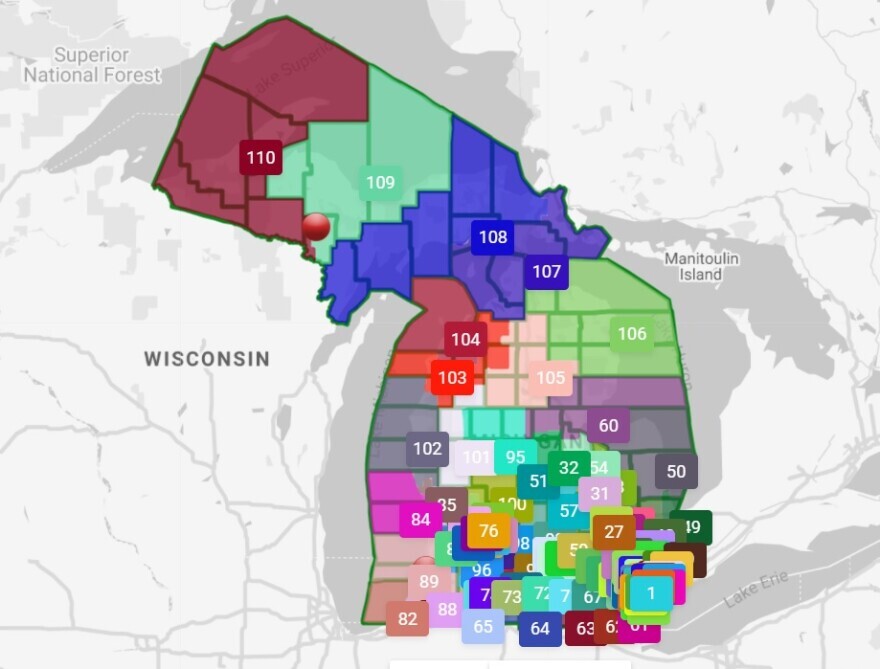A federal court ruled Thursday that more than a dozen Michigan state House and Senate districts around metro Detroit violate the U.S. Constitution.
The boundaries in question generally split the majority-Black City of Detroit into districts shared with its whiter suburbs. The plaintiffs in the lawsuit claimed that harmed Black voters’ ability to elect their candidates of choice.
At issue was whether the Michigan Independent Citizens Redistricting Commission drew those boundaries mainly with race in mind
The three-judge panel for the District Court for the Western District of Michigan ruled the commission had, violating the equal protection clause of the U.S. Constitution’s 14th Amendment, which "bars a state—absent an extremely good reason—from 'separating its citizens into different voting districts on the basis of race,'" the judges said, quoting a court ruling from a 2019 redistricting case in Virginia.
“The record here shows overwhelmingly—indeed, inescapably—that the Commission drew the boundaries of plaintiffs’ districts predominantly on the basis of race,” the Michigan court’s unanimous opinion read.
Throughout the week-long trial, the commission and its hired experts testified to their thought process while drawing the state’s legislative district maps.
Some key insights into the mapping process came from Bruce Adelson, the commission’s Voting Rights Act expert. Adelson advised the commission that he and another expert, Lisa Handley, had found Black voters would be able to elect their candidates of choice without making up the majority of a district’s voting-age population.
“And what I would suggest in moving forward in the areas where you are now, typically aim for Black populations in the 40-45% range. It’s a rough estimate,” a transcript of Adelson’s advice to the commission cited in the court opinion read.
Adelson went on to warn the commission against condensing the Detroit area’s Black voters in numbers higher than what it would take for communities to gain their desired representation.
The court dismissed that concern, saying it didn’t align with case law.
Meanwhile, the court’s opinion noted the commission, made up of 13 citizens randomly selected from a pool of candidates with no prior experience in this realm, often took their experts' advice to heart.
“[T]he commissioners did as their experts said—with great difficulty, and misgivings throughout, and over the vociferous objections of Detroit residents at the time—so that, in the end, the Commission limited the percentages of black voters, in the districts at issue here, to the racial targets their experts had given them,” the opinion read.
The court is requiring the districts be redrawn before elections can be held in them. To help meet that goal, the court is requiring both sides in the lawsuit to submit briefs by January 2, 2024 on how to best proceed.
It could spell arduous work for the commission. Redrawing metro-Detroit is likely to have repercussions for the rest of the state.
In a statement issued Friday, the commission said it "carefully followed" the criteria for drawing districts laid out in the Michigan Constitution "to draw fair maps with citizen input," and that the court's ruling was "unnecessarily harsh."
The commission did not rule out appealing the ruling, saying only that it "will consider its options moving forward."
To further complicate matters, the commission is down a member.
Dustin Witjes, who had been part of both the mapping process and legal defense of that work, announced his resignation Wednesday.
At a meeting last week, a fellow commissioner, Rebecca Szetela, accused Witjes of living out of state for the past year.
The state constitution requires members on the commission to be registered Michigan voters. MICRC attorney Nate Fink told commissioners Witjes remains a Michigan voter, despite working in Illinois.
Witjes said he had originally planned to leverage the Illinois job into one back in Michigan, but plans had changed.
On Thursday, before the court decision came out, Witjes said he planned to step down after a court ruling. But last week’s controversy changed that timeline.
“Since Commissioner Rebecca Szetela brought it into question, I just decided why not just move it forward a week and a half it wasn’t going to hurt anything,” Witjes said.
A random drawing to replace Witjes, a Democratic member of the commission, is scheduled for January 3, 2024.





